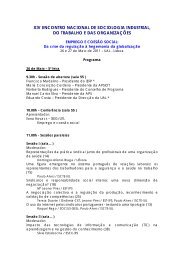Web-based Learning Solutions for Communities of Practice
Web-based Learning Solutions for Communities of Practice
Web-based Learning Solutions for Communities of Practice
Create successful ePaper yourself
Turn your PDF publications into a flip-book with our unique Google optimized e-Paper software.
Klijn, E., & Coppenhan, J. (2000). Public management<br />
and policy networks: Foundations <strong>of</strong> a network approach<br />
to governance. Public Management, an International<br />
Journal <strong>of</strong> Research and Theory, 2(2), 135-158. Retrieved<br />
February 3, 2001, from http://www.inlogov.bham.ac.uk/<br />
pdfs/readinglists/Klijn%20and%20Koppenjan%20<br />
on%20policy%20network%20theory.pdf<br />
Knuttila, M. (2002) Introducing sociology: A critical<br />
perspective. Don Mills, Ontario, Canada: Ox<strong>for</strong>d University<br />
Press.<br />
Koeglreiter, G., Smith, R., & Torlina, L. (2006). The<br />
role <strong>of</strong> in<strong>for</strong>mal groups in organisational knowledge<br />
work: Understanding an emerging community <strong>of</strong> practice.<br />
International Journal <strong>of</strong> Knowledge Management,<br />
2(1), 6-23.<br />
Kohlhase, M., & Anghelache, R. (2004). Towards collaborative<br />
content management and version control <strong>for</strong><br />
structured mathematical knowledge. In Proceedings<br />
Mathematical Knowledge Management: 2nd International<br />
Conference, MKM 2003, Bertinoro, Italy,.<br />
Kolb, A. (1984). Experiential learning: Experience as<br />
the source <strong>of</strong> learning and development. Boston: McBer<br />
& Company.<br />
Kolb, A. Y., & Kolb, D. A. (2005). The Kolb learning<br />
style inventory – version 3.1 2005 technical specifications.<br />
Experience Based <strong>Learning</strong> Systems Inc.<br />
Kopp, S. F. (2000). The role <strong>of</strong> self-esteem. LukeNotes,<br />
4(2).<br />
Kort, B., & Reilly, R. (2002). Analytical models <strong>of</strong> emotions,<br />
learning and relationships: Towards an affect-sensitive<br />
cognitive machine. In Proceedings <strong>of</strong> the Conference<br />
on Virtual Worlds and Simulation (VWSim 2002).<br />
Koschmann, T. D. (1999). Toward a dialogic theory <strong>of</strong><br />
learning: Bakhtin’s contribution to understanding learning<br />
in settings <strong>of</strong> collaboration. In C. M. Hoadley & J.<br />
Roschelle (Eds.), Proceedings <strong>of</strong> the CSCL’99 Conference<br />
(pp. 308-313). Mahwah, NJ: Lawrence Erlbaum<br />
Associates.<br />
346<br />
Compilation <strong>of</strong> References<br />
Kowch, E. G., & Schwier, R. A. (1997). Characteristics<br />
<strong>of</strong> technology-<strong>based</strong> virtual learning communities.<br />
Retrieved September 27, 2003, from http://www.usak.<br />
ca/education/coursework/802papers/communities/<br />
community<br />
Kramer, D. K., & Rundensteiner, E. A. (2001). Xem: XML<br />
evolution management. In K. Aberer & L. Liu (Eds.),<br />
Proceedings <strong>of</strong> the Eleventh International Workshop<br />
on Research Issues in Data Engineering: Document<br />
Management <strong>for</strong> Data Intensive Business and Scientific<br />
Applications, Heidelberg, Germany (pp. 103-110). Washington,<br />
DC: IEEE Computer Society.<br />
Krause, K., Hartley, R., James, R., & McInnis, C. (2005).<br />
The first year experience in Australian universities:<br />
Findings from a decade <strong>of</strong> national studies.<br />
Kreijns, K., Kirschner, P., & Jochems, W. (2002). The<br />
sociability <strong>of</strong> computer-supported collaborative learning<br />
environments. Educational Technology & Society,<br />
5(1), 8–22.<br />
Kuikka, E. (1996). Trans<strong>for</strong>mation <strong>of</strong> structured documents.<br />
Processing <strong>of</strong> structured documents using a<br />
syntax-directed approach (Doctoral dissertation). Kuopio,<br />
Finland: University <strong>of</strong> Kuopio, Computer Science<br />
and Applied Mathematics.<br />
Kushmerick, N., & Lau, T. (2005). Automated email activity<br />
management: An unsupervised learning approach.<br />
In Proceedings <strong>of</strong> the 10th International Conference on<br />
Intelligent User Interfaces (pp. 67-74).<br />
Lagoze, C., Payette, S., Shin, E., & Wilper, C. (2006).<br />
Fedora: An architecture <strong>for</strong> complex objects and their<br />
relationships. [special issue on Complex Objects]. Journal<br />
<strong>of</strong> Digital Libraries, 6(2), 124–138. doi:10.1007/s00799-<br />
005-0130-3<br />
Langley, A. (2000). Emotional intelligence - a<br />
new evaluation <strong>for</strong> management development?<br />
Career Development International, 5, 177–183.<br />
doi:10.1108/13620430010371937



